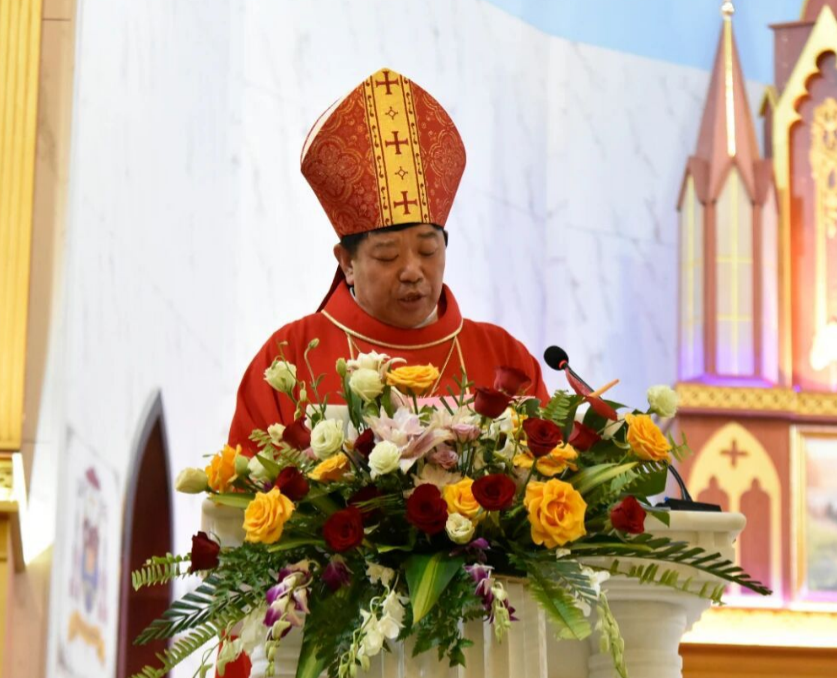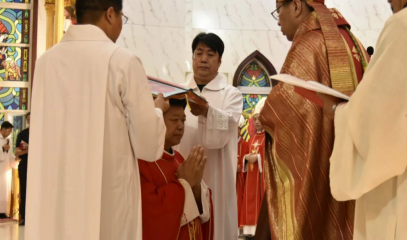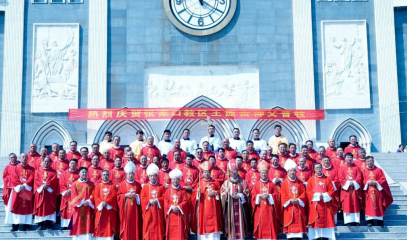A new bishop replaces underground Bishop Cui in Hebei
With the approval of Leo XIV, Wang Zhengui was ordained this morning bishop of Zhangjiakou, a "new" diocese that replaces the sees of Xuanhua and Xiwanzi. Of the two underground prelates, one becomes auxiliary bishop, while the other (repeatedly subjected to restrictive measures) will retire. Meanwhile, in the name of patriotism, the Diocese in Shanghai held a “group viewing” of Xi Jinping's parade.
Beijing (AsiaNews/Agencies) – This morning, a new episcopal ordination took place in China under the Provisional Agreement between the People’s Republic and the Holy See on the appointment of bishops.
This is a major step for Hebei, a province with an historically significant Catholic presence, but also one most strongly affected in recent years by pressure on underground communities that refuse to join the organisations of the state-sanctioned “official” Church.
Thus, as Pope Francis did before him, Leo XIV has decided to give the green light to the ordination, for the Diocese of Zhangjiakhou, of Mgr Joseph Wang Zhengui, 62, the "official" priest who, in effect, had long led what Chinese authorities considered the local diocese in the eponymous prefecture in northwestern Hebei.
“With the desire to promote the pastoral care of the Lord’s flock and to attend more effectively to its spiritual good," writes the Vatican Press Office, the pontiff suppressed the dioceses of Xuanhua and Xiwanzi, which had been erected in 1946 by Pius XII, merging them into the new episcopal see of Zhangjiakou. The new diocese, writes the Holy See, extends over the entire capital city of Zhangjiakou and 'has about 85,000 Catholics, served by 89 priests'.
In accordance with this decision, the ordination ceremony for Mgr Wang Zhengui took place this morning in the Church of the Holy Family in this city of over four million inhabitants, which came under the spotlight three years ago as the venue for many of the competitions during the 2022 Beijing Winter Olympics.
Bishop Joseph Li Shan of Beijing, who chairs the Chinese Catholic Patriotic Association (CCPA), led the service, along with Bishop Guo Jincai of Chengde, Bishop Feng Xinmao of Hengshui, Bishop Li Liangui of Cangzhou, Bishop Sun Jigen of Handan, and Bishop An Shuxin of Baoding.
According to reports from official Chinese Catholic sources, more than 50 priests from Hebei, as well as approximately 300 men and women religious, and lay people attended the liturgy.
Bishop Wang Zhengui was born on 19 November 1962 in Zhangjiakou. After attending the Hebei Catholic Theological Seminary, he was ordained on 24 May 1990, for the Diocese of Xianxian, carrying out his ministry in Qujiazhuang, a parish in Zhangjiakou. Since the mid-2000s, he has held leadership roles in official Catholic organisations in Hebei.
The significance of Bishop Wang Zhengui's ordination goes far beyond the simple redrawing of diocesan boundaries to fit those of China’s administrative units, something that has already occurred for other Chinese dioceses and elsewhere in the world.
The suppression of the dioceses of Xuanhua and Xiwanzi inevitably sends a message to the underground communities of the province, who had their own pastoral leadership.
Xuanhua is, for example, the diocese of Augustine Cui Tai, a underground bishop. Now 75 years old, he was ordained in 2013 as coadjutor bishop by Bishop Thomas Zhao Duomo, who passed away in 2018.
Never recognised by the official Church due to his refusal to join the CCPA, Bishop Cui Tai has been repeatedly subjected to restrictive measures to prevent him from carrying out his ministry as AsiaNews has reported many times.
Today's Vatican announcement makes no mention of his fate, but the invitation sent to the clergy of Hebei for today's ceremony announces a "retirement" ceremony for this Friday.
The ceremony for the installation of Joseph Ma Yanen, who was entrusted with the Diocese of Xiwanzi, as "auxiliary bishop" of Zhangjiakhou is also scheduled for that day.
Leo XIV's intention to continue to show the Church in China the path of unity through episcopal appointments is therefore clear. Less clear, however, is the fate of those priests who, in good conscience, have so far refused to comply with the obligation to register with official bodies imposed by the Chinese Communist Party, not to mention the faithful who continue to rely on them.
Indeed, we reported recently on the death of 91-year-old Bishop Placidus Pei Ronggui, a symbol in Hebei province of the suffering of this Church and of the firm belief that the Chinese government's attitude must change to truly achieve Church unity in China.
The signs are not encouraging. Political control over religions, including Catholic communities, continues to increase in Xi Jinping's China, as evidenced recently by the Churches joining in the chorus of nationalist rhetoric that marked the 80th anniversary of the end of World War II in Asia, which became a celebration of Communist China’s might.
On the website of the Diocese of Shanghai, prominent space was given to the news and pictures of the clergy and laity gathered by the local Church to follow live on a giant screen the military parade with which China showed off its new weaponry of war on 3 September.
The diocese is led by Bishop Joseph Shen Bin, who was installed unilaterally by Beijing in 2023 following a rift later healed by Pope Francis. Yet the message is clear: Shanghai's Catholics must show the patriotic loyalty that Xi demands from all religions.
10/05/2021 13:07
14/05/2021 13:57
20/01/2020 12:34
29/03/2019 09:32









.png)










